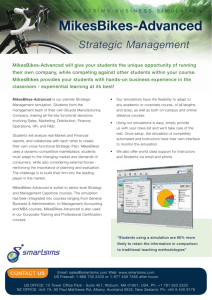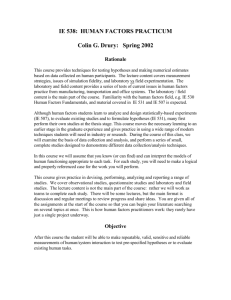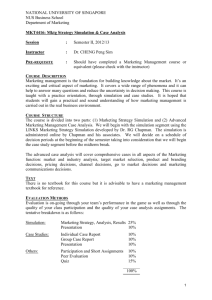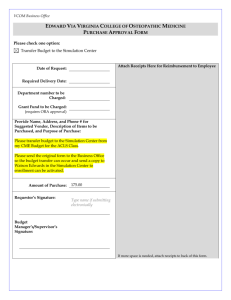POLI 298H The Theory and Practice of the Balance of Power
advertisement
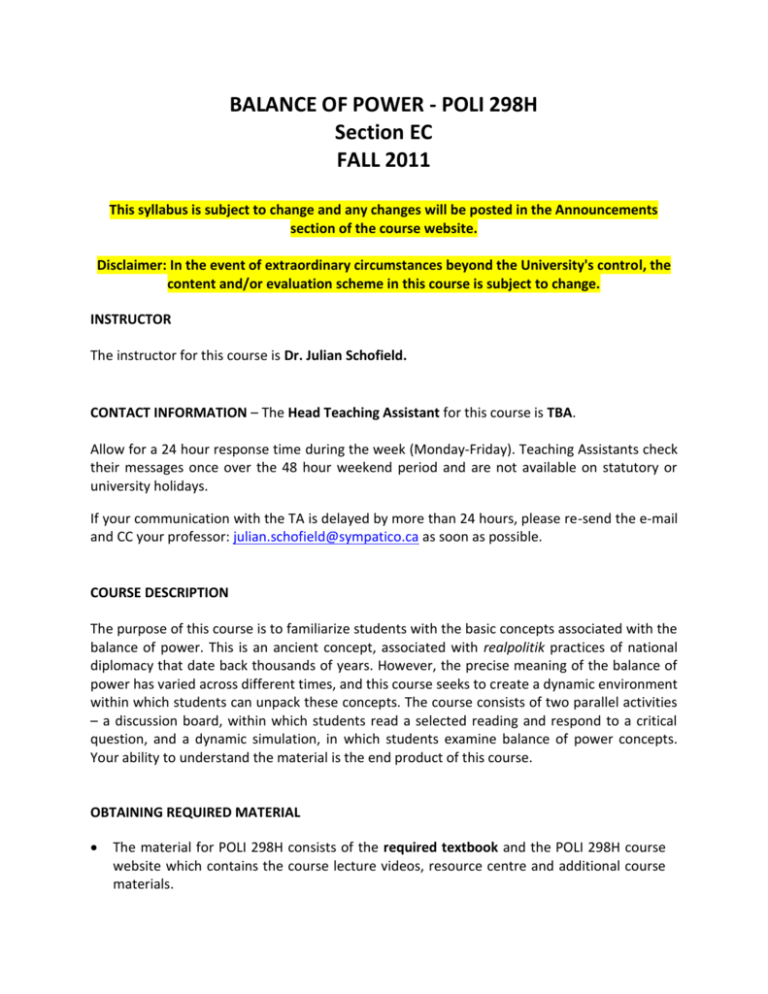
BALANCE OF POWER - POLI 298H Section EC FALL 2011 This syllabus is subject to change and any changes will be posted in the Announcements section of the course website. Disclaimer: In the event of extraordinary circumstances beyond the University's control, the content and/or evaluation scheme in this course is subject to change. INSTRUCTOR The instructor for this course is Dr. Julian Schofield. CONTACT INFORMATION – The Head Teaching Assistant for this course is TBA. Allow for a 24 hour response time during the week (Monday-Friday). Teaching Assistants check their messages once over the 48 hour weekend period and are not available on statutory or university holidays. If your communication with the TA is delayed by more than 24 hours, please re-send the e-mail and CC your professor: julian.schofield@sympatico.ca as soon as possible. COURSE DESCRIPTION The purpose of this course is to familiarize students with the basic concepts associated with the balance of power. This is an ancient concept, associated with realpolitik practices of national diplomacy that date back thousands of years. However, the precise meaning of the balance of power has varied across different times, and this course seeks to create a dynamic environment within which students can unpack these concepts. The course consists of two parallel activities – a discussion board, within which students read a selected reading and respond to a critical question, and a dynamic simulation, in which students examine balance of power concepts. Your ability to understand the material is the end product of this course. OBTAINING REQUIRED MATERIAL The material for POLI 298H consists of the required textbook and the POLI 298H course website which contains the course lecture videos, resource centre and additional course materials. Required Textbook o Michael Sheehan, The Balance of Power (London: Routledge: 1996),ISBN: 0-41511931-6. o Once you are registered for the course, you can purchase your textbooks online from the Concordia Bookstore or in person at the McConnell Building, 1400 de Maisonneuve Blvd. West. Please note that textbooks ordered online from the Concordia Bookstore will be shipped only 5 working days from the date the order was placed. COURSE WEBSITE, USERNAME & PASSWORD Your eConcordia account will be valid until the end of the term for which you are registered. Your account will allow you to access the online course material, which includes videos, notes, discussion boards, all graded course components, useful links, readings and many more resources from the course website for the duration of the term. The course website can be accessed at www.econcordia.com EASTERN TIME ZONE Please note that ALL dates and times are set for the North American Eastern Time Zone and that Quebec uses Eastern Standard Time and Eastern Daylight Time as per the appropriate dates. All students, including distance learners, are required to meet the deadline requirements according to these times. No exceptions will be made. DISCUSSION BOARD – Available as of 3:00 p.m. on SEPTEMBER 9, 2011 The discussion board is a versatile tool in an online course. It is akin to putting up your hand in class, but with a bonus: each and every student can read questions and the various answers posted, at their leisure. To access your TA’s name, contact information and your group assignment number, click on the Discussion Groups link in the left-hand side menu of your eConcordia account. Once the discussion board is made available as per the date listed above, you will be assigned to a group and a TA within 24 hours of obtaining your eConcordia username and password. If you have not been assigned to a group within 24 hours of obtaining your eConcordia username and password, send an e-mail with your name, student ID number and the name of the course you are taking to discuss@econcordia.com and you will be assigned to a group within 24 hours. GUIDELINES FOR POSTING ON THE DISCUSSION BOARD Do not post your telephone number, student ID, or any other personal information on the discussion board. Read the other postings to confirm that your question has not already been answered. The Discussion Board is meant for the academic discussion of the course material. Keep postings pertinent to the course material. Questions pertaining to grades, technical issues or questions of a personal nature must be addressed directly to your TA via e-mail. Posts of this nature will be removed by the Forum Administrator. Of vital importance is respectful behavior on the discussion board. Refrain from making offensive statements and derogatory comments. For example, students must never insult another person or teaching assistant in a discussion. Students who fail to respect these rules will be asked to leave the discussion. It is within our discretion and authority to edit or remove any posting at any time. Please see the Code of Rights and Responsibilities. OFFICE HOURS There are no official physical office hours for this course; however your TAs will log on to the discussion board and respond to your posts and emails within 24 hours. Your TAs will also have virtual office hours wherein they will be logged onto the discussion board at a predetermined date and time to answer your questions in real time. The virtual office hours schedule will be made available the second week of the course. COMMUNICATION You will be communicating with your assigned Teaching Assistants and eConcordia personnel via e-mail. You are required to include the following information in all your e-mail communication: o Full name o Concordia student ID number o Course name and number pertaining to your inquiry Save a copy of all e-mail correspondence for the duration of the term and until the final letter grade for your course has been posted in your MyConcordia portal. If the TA does not respond within 24 hours then re-send the correspondence to the TA and CC the professor: julian.schofield@sympatico.ca We strongly encourage you to use a Concordia University e-mail account or an account from a provider such as Sympatico, Videotron, etc. o Free e-mail accounts such as Hotmail, Yahoo, etc. are NOT recommended and very often lead to communication problems. o You can obtain a LIVE@EDU e-mail account through your My Concordia Portal by clicking on the link titled “Personal Services” followed by “Computer Accounts & Passwords”. o For more information about these accounts and other services offered by Concordia’s IITS department, you may visit CC-207 or H-925 or http://helpline.concordia.ca/. o Your e-mail address must be registered in your MyConcordia Portal as well as in the Student Profile of your My eConcordia Portal. ANNOUNCEMENTS Important information regarding the course will be communicated to you via the Announcements Section of the course website. The announcements are located in the centre of the main page upon logging in to your eConcordia account. Please make sure to read the postings on a weekly basis. GRADED ASSESSMENTS COMPONENT GRADE % Discussion Groups 30 Simulation Participation 10 Simulation Report: Hypotheses Outcomes 5 Mid-term Exam 10 Paper Proposal 5 Paper 20 Final Examination 20 MID-TERM EXAM The mid-term exam is an online exam. Questions will be posted on the course website and students will have a period specified in the agenda of this course outline in which to answer them; the questions will require very precise answers. The exam will be comprised of a list of approximately twenty multiple-choice questions. The criteria for correct answers will be the best possible answer, not simply the correct answer. The questions are somewhat tricky in this respect because of the open book nature of the mid-term exam. You will have access to the mid-term questions on the date specified in the agenda. The exam must be submitted by the deadline indicated in the agenda in order to obtain a grade. Instructions on submitting your answers will be posted with the mid-term questions. PAPER PROPOSAL AND PAPER Students are required to complete a course paper. This is a 1,500-word researched and detailed analysis of an historical period or region approved by the professor (not including footnotes or bibliography). Approval is obtained by submitting a paper proposal (use the format posted on the website) to the professor, who will respond with a “yes” or a “redo”. Webster library has social science research librarians available to assist students in the reference section (2 nd floor). ONLINE DISCUSSION CONFERENCES Students will be marked for cogent, coherent and quality participation in one of ten alphabetically organized online discussion conferences. Students must participate frequently (34 postings/lesson). Students may not post more than once per day; this compels the student to spread their responses out over a week and facilitates an interactive debate. The assignment of your discussion group will be listed on the website and will begin on the date indicated in the Weekly Planner. The topic of discussion will consist of the reading for that week, and will focus on a critical question. Participation in the discussion group is mandatory, and half of the participation grade will be awarded for specific reference to the assigned readings. Both the instructor and the Teaching Assistants will ensure that the discussion remains focused and reflects the readings for the particular segment. Be interactive; this is a discussion about the critical questions, so take the time to read the comments of others and respond to them with a substantiated argument. You must answer that segment’s critical question in the first post, and the remaining posts are expected to be your responses to the opinions of your discussion group colleagues. The average length of comments should be 10 lines (for a total of 30 lines per subject). Therefore, no winging it without reference to the readings, and no opinions without a logical argument related to some principle mentioned in the text or the critical question. Keep the discussions focused on the critical question – we will erase comments, however true, that stray from the subject, engage in polemics, or are normative. To save time and as back-up, you are required to keep a record of all of your postings. To facilitate the reading of others (spelling and grammar mistakes) you should write the discussion up in a word-processor and then copy and paste it to post it (type and save all your work in a Word document). Students may not save up discussions for later periods, may not post on Saturday without a legitimate reason given to the TAs (this is the fallback emergency participation day), and may not post on Sundays at all. Students are encouraged to e-mail the TAs individually for feedback on how to improve and raise the grades within a ten-day delay after a segment is complete and their grade posted. BALANCE OF POWER SIMULATIONS The course work is accompanied by a balance of power simulation. The specific rules as well as a tutorial about the simulation are posted on the site. The professor reserves the right to reassign a student to a different game. Each simulation consists of a game of seven students each playing one of seven states in a simulation of early twentieth-century Europe. Students must access the simulation section on the site and they will be provided with a game name and password, which they will then use when signing up to play the game. Students will be assigned states at random. Students are awarded grades for submitting move orders to the computer, at a minimum, every Monday and Thursday. The computer logs all submitted orders. Students may play more frequently if they wish. Students are graded with full marks for participation, not winning or for the quality of their play. SIMULATION REPORT: Hypotheses Outcomes The simulation report is to be submitted at the conclusion of the course and is to use the simulation played to address the list of balance of power hypotheses provided on the website. In effect, you are to address issues like balancing and bandwagoning and to discuss whether and when they occurred within the simulation. POLICY ON EXTENSIONS AND LATE SUBMISSION Any request for an extension must be received before the deadline or it will not be accepted. In fairness to all students, there will not be any exceptions to this policy. It is your responsibility to ensure that if you are unable to complete your work by the deadline or write an exam on the assigned date, you must request an extension beforehand via e-mail to the attention of your Teaching Assistant. Extensions will be granted only to students who are able to provide a reasonable and verifiable medical note before the deadline. Medical notes must include dates within which you are excused from work/school. In the case of emergencies, it is your responsibility to notify your Teaching Assistant via email as soon as the issue arises in order to determine the course of action required for the matter at hand. Organize your time effectively to ensure that you submit your work on time. Any work submitted after the deadline is considered late and will NOT BE GRADED. Vacations and travel plans (work-related or otherwise) are not considered valid reasons for late submissions of or an inability to complete assignments, quizzes and exams. Please note that you are responsible for the version of the work you upload to the website. If you upload the incorrect version of your work to the website, you can resubmit the correct version prior to the deadline. If you fail to meet the deadline, the version of your work located on the website is the one that will be graded. In addition, please note that it is your responsibility to ensure that your assignment is received before the deadline. Should you be unable to submit your work via the website you must submit your work via e-mail to your TA before the deadline. Please give yourself enough time for online submissions to send your assignments via e-mail should a technical issue arise. FINAL EXAMINATION: DATE AND LOCATION TBA The final examination is an in-class written exam. Official Exam week is determined by Concordia University and the date and location of the final exam is scheduled within that week. It is the responsibility of the student to verify the date/time/location and room assignment for the final exam posted in their MyConcordia Portal. The final exam date will not be posted on the eConcordia website. Do not schedule flights or vacations until the official examination date is released. Vacations and travel plans are not considered a valid reason for a deferral request. EXTERNAL EXAMS – OUT-OF-REGION STUDENTS • If you are NOT located in the Montreal area and cannot attend the final exam at Concordia, eConcordia can assist you in making arrangements to write the exam at a university in your region. • External exams are written on the exam date set for the course by the Concordia Exams Office. • You can obtain an External Exam Request Form as well as all pertinent instructions in the External Exam link in the Student Menu of your eConcordia portal. All requests for an external exam are to be submitted via e-mail to: exams@econcordia.com. • For more information about the external exam option, please call 514-848-8774 or 1888-361-4949. • The external exam request deadline for the final exam is indicated in the MyAgenda tab of the course website. • Late requests will NOT be accommodated. ALL fees incurred to write an external exam are the responsibility of the student. Fees vary per institution; please contact your institution for applicable fees. It is the responsibility of the student to inquire about the fee with the Institution prior to scheduling the exam. GRADES In order to view your grades throughout the semester, click on the My Grades link in your eConcordia portal. It is your responsibility to ensure your work has been received (to be verified as outlined in your assignment instructions), and to contact your TA via e-mail for clarification if you have any questions concerning your grades. Your final letter grade for the course will be posted in your MyConcordia Portal at the end of the term. Administrative Issues: Current university policy is that there is no professorial discretion with regard to incomplete assignments -assignments not received before a reasonable time before the required date of grade submission must proceed through regular grade change channels. Late assignments will not receive comments. I cannot replace one poorly done assignment with another assignment arrived through a private arrangement with a student - I am required by the university to apply the syllabus. Significant changes to the syllabus require unanimous consent of students and professor. Please do not bombard the professor with twitter-like emails. For letters of recommendation, drop the required pre-filled forms (including my name, title, etc), stamped and addressed envelopes, your transcript, letter of intent, and instructions. You will receive a much better letter of recommendation if I know who you are. I will only mail out letters of recommendation, and not hand them back to students, nor will I produce letters for non-specific purposes. TECHNICAL REQUIREMENTS The technical requirements for accessing the online material are listed within the course content and on our main website: http://www.econcordia.com/home/elearning.aspx?section=224 . If your existing hardware does not meet the requirements, you may experience a lower level of quality and accessibility to our website and course content. TECHNICAL ISSUES – eConcordia Help Desk For any technical questions or inquiries (login or account issues), or if you are having difficulty accessing the eConcordia site, please contact eConcordia's Help Desk at: helpdesk@econcordia.com 514-848-8774 or toll free 1-888-361-4949 At eConcordia we take every possible measure to ensure that your e-learning experience runs as smoothly as possible. There may be times, however, when you encounter technical difficulties that are simply beyond our control. This can include unforeseen network, server or connectivity issues. It is the responsibility of each student to ensure that s/he saves a copy of all work to be submitted through the system. This applies to any work sent via e-mail and uploads and textbox submissions to the website. You are required to save copies of work on both a computer hard drive and an external storage device (diskette, CD or USB key). In the event that a technical problem does arise while submitting your work, please send a copy of the error message you received in the body of your e-mail to helpdesk@econcordia.com and one of our agents will assist you. DEPARTMENT OF POLITICAL SCIENCE STATEMENT ON PLAGIARISM The Department has zero tolerance for plagiarism. 1. What is plagiarism? The University in its Academic Integrity and the Academic Code of Conduct defines plagiarism as “The presentation of the work of another person as one’s own or without proper acknowledgement.” (http://registrar.concordia.ca/calendar/17/17.10.html) 2. What are the consequences of getting caught? One of the following sanctions may be imposed: a) a written reprimand; b) a piece of work be re-submitted; c) specified community service at the University of up to ten (10) hours per week for a specified period of time; d) a failing grade for the piece of work in question or for the course, if applicable; e) a failing grade and ineligibility for a supplemental examination or any other evaluative exercise for the course; f) the obligation to take and pass courses of up to twenty-four (24) credits in addition to the total number of credits required for the student’s program as specified by the Academic Hearing Panel. If the student is registered as an Independent student, the sanction will be imposed only if he or she applied and is accepted into a program; g) suspension for a period not to exceed six (6) academic terms. Suspensions shall entail the withdrawal of all University privileges, including the right to enter and be upon University premises; h) expulsion from the University. Expulsion entails the permanent termination of all University privileges. (http://registrar.concordia.ca/calendar/17/17.10.html) For more information on this subject, see the Academic Integrity website of the University found at: http://www.concordia.ca/academicintegrity. To find out more about how to avoid plagiarism, see the “What is Plagiarism?” section of the Academic Integrity website found at: http://provost.concordia.ca/academicintegrity/plagiarism/ or have a look at the Political Science Department’s Resources on Avoiding Plagiarism at: http://politicalscience.concordia.ca/plagiarism_resource/. STUDY SKILLS: YOUR GUIDE TO ONLINE LEARNING At eConcordia we want you to succeed as an online learner. Whether you need help managing your time efficiently, understanding your assignments, or writing exams, this self-directed tutorial will provide you with tips on how to improve your study strategies. Furthermore, reviewing this tutorial while taking a course will assist you in developing important skills such as note taking, critical thinking, conducting research, and writing, which will ultimately contribute to your academic achievements both online and in traditional settings. COURSE EVALUATION Approximately one week prior to the end of the term, you will receive an e-mail message asking you to complete a course evaluation. Click on the link in the e-mail and follow the instructions. Please note that all responses are completely anonymous and will be kept confidential. We value your opinion; your feedback regarding your experience with eConcordia is greatly appreciated. See the Agenda on the next page. POLI 298h – Balance of Power Agenda FALL 2011 All deadlines indicated are on the due date listed by 11:59 p.m. unless otherwise indicated. Week 1: September 6 – September 11 September 7 Discussion Board opens at 3:00 p.m. eC Navigate the course website Lesson 0 : Getting Started Review the course outline Week 2: September 12 – September 18 Review: Lesson 1: Introduction to Balance of Power Read: “Introduction to Balance of Power” ! SEPTEMBER 16 RESPOND TO CRITICAL QUESTIONS ON THE DISCUSSION BOARD PARTICIPATE IN SIMULATION: PHPDIPLOMACY (PRACTICE PHASE) Week 3: September 19 – September 25 ! ! September 19 DNE Date: Academic withdrawal deadline (with tuition refund) September 19 Last day to add Fall-term courses: ! SEPTEMBER 22 PAPER PROPOSAL DUE ! Review: Lesson 2: The Meaning of the Balance of Power Read: Ch. 1 “The Meaning of the Balance of Power,” pp. 1-23 ! SEPTEMBER 20 RESPOND TO CRITICAL QUESTIONS ON THE DISCUSSION BOARD PARTICIPATE IN SIMULATION: PHPDIPLOMACY (GRADED FROM THIS POINT ! SEPTEMBER 19 and ONWARDS) SEPTEMBER 22 ORDERS DUE: SEPTEMBER 19 and SEPTEMBER 22 Week 4: September 26 – October 2 ! ! ! Review: Lesson 3: Intellectual Origins and Early Development Read: Ch. 2 “Intellectual Origins and Early Development,” pp. 24-52 ! SEPTEMBER 30 RESPOND TO CRITICAL QUESTIONS ON THE DISCUSSION BOARD ! SEPTEMBER 26 PARTICIPATE IN SIMULATION: PHPDIPLOMACY AND SEPTEMBER 29 ORDERS DUE: SEPTEMBER 26 AND SEPTEMBER 29 Week 5: October 3 – October 9 ! ! Review: Lesson 4: Balance of Power Politics Read: Ch. 3 “Balance of Power Politics,” pp. 53-75 ! OCTOBER 6 ! OCTOBER 3 AND OCTOBER 6 RESPOND TO CRITICAL QUESTIONS ON THE DISCUSSION BOARD PARTICIPATE IN SIMULATION: PHPDIPLOMACY ORDERS DUE: OCTOBER 3 AND OCTOBER 6 ! ! Week 6: October 10 – October 16 October 10 University Closed - Thanksgiving Review: Lesson 5: Balance of Power Systems Read: Ch. 4 “Balance of Power Systems,” pp. 76-96 ! OCTOBER 14 RESPOND TO CRITICAL QUESTIONS ON THE DISCUSSION BOARD ! OCTOBER 10 AND PARTICIPATE IN SIMULATION: PHPDIPLOMACY OCTOBER 13 ORDERS DUE: OCTOBER 10 AND OCTOBER 13 Week 7: October 17 – October 23 ! ! OCTOBER 17 ! MID-TERM EXAM POSTED ! ! OCTOBER 21 MID-TERM EXAM DUE Week 8: October 24 – October 30 ! ! OCTOBER 27 ! PAPER DUE Review: Lesson 6: The Eighteenth Century: 1700-1815 ! OCTOBER 28 ! OCTOBER 24 AND OCTOBER 27 October 30 Read: Ch. 5 “The Eighteenth Century: 1700-1815,” pp. 145-169 RESPOND TO CRITICAL QUESTIONS ON THE DISCUSSION BOARD: MARCH 4 (DEADLINE) PARTICIPATE IN SIMULATION: PHPDIPLOMACY ORDERS DUE: OCTOBER 24 AND OCTOBER 27 DISC Date: Academic withdrawal deadline (without tuition refund) ! ! Week 9: October 31 – November 6 Review: Lesson 7: The Nineteenth Century: 1815-1914 Read: Ch. 6 “The Nineteenth Century: 1815-1914,” pp. 121-144 ! NOVEMBER 4 RESPOND TO CRITICAL QUESTIONS ON THE DISCUSSION BOARD ! OCTOBER 31 AND PARTICIPATE IN SIMULATION: PHPDIPLOMACY NOVEMBER 3 ORDERS DUE: OCTOBER 31 AND NOVEMBER 3 Week 10: November 7 – November 13 ! ! Review: Lesson 8: Competing Perspectives Read: Ch. 7 “Competing Perspectives,” pp. 145-169 ! NOVEMBER 11 RESPOND TO CRITICAL QUESTIONS ON THE DISCUSSION BOARD ! NOVEMBER 7 AND PARTICIPATE IN SIMULATION: PHPDIPLOMACY NOVEMBER 10 ORDERS DUE: NOVEMBER 7 AND NOVEMBER 10 Week 11: November 14 – November 20 External Exam Application Deadline for final (Students NOT writing at November 15 Concordia) ! ! eC Review: Lesson 9: The Nuclear Era and the Future of the Balance of Power Read: Ch. 8 “The Balance of Power in the Nuclear Era,” pp. 170-191 ! NOVEMBER 18 RESPOND TO CRITICAL QUESTIONS ON THE DISCUSSION BOARD ! ! NOVEMBER 14 PARTICIPATE IN SIMULATION: PHPDIPLOMACY AND NOVEMBER 17 ORDERS DUE: NOVEMBER 14 AND NOVEMBER 17 Week 12: November 21 – November 27 ! Read: Ch. 9 “The Future of the Balance of Power Concept,” pp. 192-205 Week 13: November 28 – December 4 November 28 Complete Course Evaluation ! DECEMBER 2 SIMULATION REPORT DUE Week 14: December 5 – December 11 December 5 Last day of classes – Fall Term eC ! December 7 – December 22 Examination Period Exam date, time and location to be posted in your MyConcordia Portal This syllabus is subject to change and any changes will be posted in the Announcements section of the course website. Disclaimer: In the event of extraordinary circumstances beyond the University's control, the content and/or evaluation scheme in this course is subject to change.
